Brian Clegg's Blog, page 126
January 23, 2013
The socket is the new black
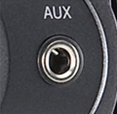 I quite regularly drive two cars - a VW Golf Plus and a Vauxhall Corsa. In principle the Golf should win on everything. It's more comfortable, it has considerably better acceleration and it is better made. However give me the choice (which I don't often get as I share the Corsa with daughter #1) and I will go for the Corsa almost every time.
I quite regularly drive two cars - a VW Golf Plus and a Vauxhall Corsa. In principle the Golf should win on everything. It's more comfortable, it has considerably better acceleration and it is better made. However give me the choice (which I don't often get as I share the Corsa with daughter #1) and I will go for the Corsa almost every time.The reason is ridiculously trivial at first sight. The Corsa has a better sound system. It produces better quality sound - more bass and treble - but most significantly of all it has an 'aux' socket to plug in an MP3 player. The Golf doesn't. We have one of those radio transmitter workarounds in the VW - but it's not the same by a long way, especially if you want to play classical music, which is typically recorded at significantly lower levels, so gets a lot more interference when you blast the audio up to an appropriate level.
These days I tend to stare at the CD slot in a car's audio system in bemusement, trying to remember what it's for. We do still get CDs - I had 12 as presents at Christmas - but once they have been imported into iTunes they go on the shelf as backup.
I think I can honestly say that whether or not I can connect my phone to play music would now be a make or break when we next buy a car - about the same level as 'does it have a heater' and slightly above 'does it have air conditioning.' If car manufacturers are still making cars without the appropriate socket, they are, frankly, stupid. It isn't a luxury. It isn't an add-on. It's a basic now as far as in-car entertainment is concerned.
Published on January 23, 2013 01:27
January 22, 2013
The Silent Spring dilemma
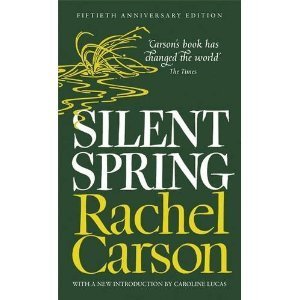 I was listening to a programme on the radio the other day about Rachel Carson, arguably one of the founders of the environmental movement, whose 1960s book
Silent Spring
had such a huge influence, particularly on the banning of DDT. The programme was little short of a hagiography. You would not think, listening to it, that there was any controversy about Carson's influence - yet some would say that she was responsible for millions of deaths.
I was listening to a programme on the radio the other day about Rachel Carson, arguably one of the founders of the environmental movement, whose 1960s book
Silent Spring
had such a huge influence, particularly on the banning of DDT. The programme was little short of a hagiography. You would not think, listening to it, that there was any controversy about Carson's influence - yet some would say that she was responsible for millions of deaths.There is no doubt at all that the way DDT was being used in some countries when Carson wrote her book - in America in particular - was wrong. This potent compound was being sprayed in a blanket fashion as an agricultural pesticide and was causing much damage to the environment and quite possibly to people. This was, without doubt, dire - and Carson did the world a favour by pointing out the terrible consequences, like the eponymous idea of killing the birds and producing a 'silent spring.'
However, it is also true that used in a controlled fashion, targeted on areas where mosquitoes breed, DDT was a very effective way of reducing the spread of malaria. Had it not been banned, a ban instituted in large part as a reaction to Silent Spring, and had it been used in an appropriately controlled way, there would have been millions of lived saved.
This Silent Spring dilemma illustrates the biggest problem the traditional green movement has. It is often based on knee-jerk reactions to words and concepts. Natural good; artificial bad. Chemical bad (forgetting that every substance we eat, drink and breathe is made of chemicals). Organic good, intensive bad. Burning wood good, using nuclear power bad. And, in this case, pesticide very bad. If we really want to be green and be rational we need to think through the implications of words in context, not just react to the words themselves. Most things are good in some circumstances and bad in others. Often it's a case that doing something to excess is bad, while doing it in a controlled way is good.
The devil is in the detail. Unless we can get down to that detail and really understand the science that often lurks behind it, we will be like people who respond to advertising and marketing, rather than understanding what's really good for us. And surely an ignorant, marketing-led response not the right way to be green?
This has been a green heretic production.
Published on January 22, 2013 00:27
January 21, 2013
Two nations divided
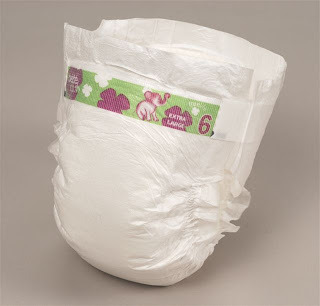 This is NOT a napkinAs an Englishman* who quite often writes for an American publisher I am all too aware of the way we are indeed two nations divided by a common language. To be fair, modern media has weakened this significantly. We all know over here what an American means when she refer to an elevator, and even cope with the confusion over purses, vests, suspenders and pants. Similarly, I gather from articles in the US press, that some quaint English English terms like loo and saying 'cheers' for goodbye have become more familiar that side of the Atlantic. Even so, I do occasionally make a slip.
This is NOT a napkinAs an Englishman* who quite often writes for an American publisher I am all too aware of the way we are indeed two nations divided by a common language. To be fair, modern media has weakened this significantly. We all know over here what an American means when she refer to an elevator, and even cope with the confusion over purses, vests, suspenders and pants. Similarly, I gather from articles in the US press, that some quaint English English terms like loo and saying 'cheers' for goodbye have become more familiar that side of the Atlantic. Even so, I do occasionally make a slip.A while ago, for example, I was referring to the peculiarity of action at a distance. The idea that you can make something happen remotely without anything passing from A to B is a difficulty that underlies some of the confusion caused by quantum theory, and was why Newton got so much stick for his work on gravitation. I said that we expect something to travel from A to B to make something happen. For instance, in a coconut shy, we expect to have to throw a ball at the coconut, rather than just look at it and make it fall off its stand. 'A coconut WHAT???' said my US editor. In the book it ended up as having to throw a stone to knock a can (not a tin, of course) off a wall.
Even those who are experts can get caught out with subtle differences of meaning. I remember being most amused a number of years ago by a book by an American expert on international business. The topic of the book was not making errors by using words and methods that weren't appropriate in a foreign country. He gave the example of an American opening a restaurant chain in England. 'You must make sure,' he said, 'that you call the napkins "serviettes". In England, a napkin is the word for a diaper.'
UK readers will get why this is so wrong. For US readers, we actually call a diaper a 'nappy' over here. Although that word is derived from napkin we would never call a diaper a 'napkin'. In fact in UK English, napkin is the more proper word for a napkin (well, duh) - 'serviette' (the French word) is considered rather common, a bit like saying 'john' or 'can' rather than 'bathroom'.
*I don't know why, but I get a buzz from referring to myself as 'an Englishman.' Perhaps it's something to do with Sting's song, An Englishman in New York.
Published on January 21, 2013 01:28
January 18, 2013
Rust - pretty unpopular
 My latest podcast for the Royal Society of Chemistry takes a look at a compound that doesn't have many of us cheering - in fact it's pretty unpopular all round. I'm talking about rust. We may rather like the fetching patina of some metal oxides, but no one cheers when rust appears - especially if it's on a car.
My latest podcast for the Royal Society of Chemistry takes a look at a compound that doesn't have many of us cheering - in fact it's pretty unpopular all round. I'm talking about rust. We may rather like the fetching patina of some metal oxides, but no one cheers when rust appears - especially if it's on a car.Even so, that doesn't mean that rust isn't interesting stuff from the chemical viewpoint. Quite the reverse. So pop along to the RSC compounds site - or if you've five minutes to spare, click to to have a listen to my podcast on rust.
Published on January 18, 2013 00:32
January 17, 2013
Walk away from the Sony
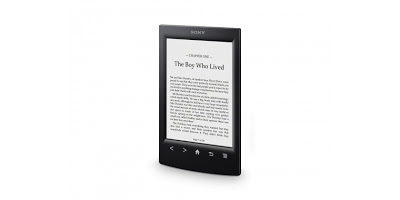 Want one of these? Resist the urge..I think Sony has taken a significant business opportunity of becoming a big player in small e-devices and has managed to turn it into a disaster.
Want one of these? Resist the urge..I think Sony has taken a significant business opportunity of becoming a big player in small e-devices and has managed to turn it into a disaster.Let me explain. I used to be a regular buyer of Sony products. I've had a Walkman, TVs, a VCR (remember those), a laptop... but I would never buy one of Sony's small electronic devices post-Walkman because they made a fundamental error of judgement. They made it 'our way or not at all.'
I have never had a Sony video camera or digital camera. Why? Because they insist on using their own memory card format that's incompatible with everyone else's. And when you come to connect the device to your computer you can't just drag and drop files, you have to use their proprietary, slow and clunky PC software to communicate with the device. The same goes for their music players. Hopelessly crippled by the truly awful associated software you are forced to use. And as for their ebook readers... you get the picture. (It's also true that Sony's seems the least supported ebook format in terms of new book releases these days.)
But am I not being hypocritical? Don't my iPhone and iPad also use proprietary and slow software on the computer? There's a big difference though. If yours is the dominant environment (as with iTunes) or if you have software that is built in with the operating system (like iTunes or Windows Media Player on Macs and PCs respectively) it's fine to expect us to use it. But when you are only an aspiring small fry it doesn't work to try to impose your 'standard'.
I think the trouble is that Sony were so used to being dominant with the Walkman that they assumed they were top dog in other parallel small electronics markets as well. At risk of mixing the animal metaphors, Sony was so used to being a big fish that it forgets that in this particular pond it is down with the minnows. And that has led to a fall.
If they haven't already, Sony should drop the proprietary formats, lose their awful software and get in with the masses before it's too late. We all know it makes sense.
But does Sony?
Published on January 17, 2013 00:45
January 16, 2013
When space isn't cold enough
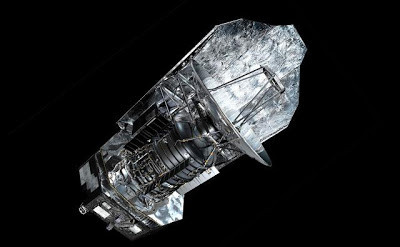 Not a Blue Peter model - the actual Herschel Space ObservatoryWe are used to thinking of space as a cold place. And it is, sort of - but not always in the ways you might expect.
Not a Blue Peter model - the actual Herschel Space ObservatoryWe are used to thinking of space as a cold place. And it is, sort of - but not always in the ways you might expect.For instance, if you were suddenly dropped into space you might assume that the minimal temperature out there would mean that your blood would freeze solid in your veins, while simultaneously trying to boil where any is exposed due to a lack of pressure. But here's the thing. It won't boil - your circulatory system will keep it under pressure - and it won't freeze because a vacuum makes a great insulator. Remember vacuum flasks - there's a lesson there. The only heat you will lose is through radiation and you aren't hot enough to do that quickly.
Even so, it's rather ironic that space just isn't cold enough for the Herschel Space Observatory. It was sent up with 2160 litres of liquid helium to keep it cool. but that is due to run out by the end of March, leaving the Herschel to die of warmth in space - without that helium, the electromagnetic radiation emitted by the satellite itself will be enough to mask the subtle stream of photons it has been detecting.
The Herschel has done great work on helping us understand how stars and galaxies are formed, peering back around 10 billion years in time, picking up weak sub-millimetre light from the dust around newly formed stars. The good news, though, is that although the Herschel is soon to stop functioning, according to Steve Eales at the University of Cardiff, an astronomer who leads one of the telescope’s largest surveys, 'the treasure trove of Herschel data will be picked through by astronomers for years to come.' That's good to know.
Thanks to Physics World (also featuring an excellent article by me (ahem) on the need for double blind experiments in physics to deal with experimenter bias in the January edition) for this info.
Published on January 16, 2013 01:03
January 15, 2013
In praise of Jeremy Clarkson
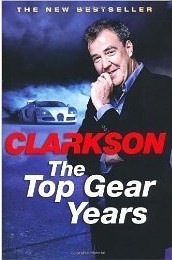 The book what I got for Christmas
The book what I got for Christmas(sic)A couple of years ago at Christmas I commented that I was in danger of turning into Jeremy Clarkson. Now, having received another of his books in my Christmas stocking, I want to reflect on why he really doesn't deserve the opprobrium that is heaped on him. (Can you do anything else with opprobrium but heap it?)
People who whinge about how terrible Clarkson is miss the point. The same people probably say how clever the Alan Partridge character is. And yet Alan Partridge is not Mister Likeable. He is thoroughly detestable. The same goes for Keith Lemon if you like him, which I gather some do. (I can't stand either of them, but that's a different story.) The point is that these are grotesque characters invented for TV. And, I would suggest to you, so is Jeremy Clarkson. Okay, he may not use a fictional character name as the other two do, but what he does is still an entertaining act.
You may, by now, be frothing at the mouth, determined to point out that Clarkson really means it where Partridge and Lemon are pure fiction. And some of the time I'm sure Clarkson does. But really this is beside the point. If you treat him as a character, he is very amusing. His writing style is light and entertaining. He sometimes even makes quite sensible observations when political correctness has forced us all in a different direction. What's not to love? No one gets nasty about the highly amusing rants that David Mitchell writes - they accept that they are amusing journalism. And I argue Clarkson should get the same treatment. So give the man a rest.
If you're an author you only hate him because he sells more books that you do. And otherwise, you're only jealous because he has a nicer car than yours...
Published on January 15, 2013 00:52
January 14, 2013
We've had babies
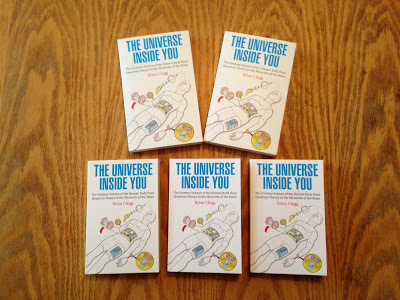 Look, dear, we've had babies!
Look, dear, we've had babies!(Trade at top, mass market at bottom)I'm delighted to say that the paperback versions of The Universe Inside You have arrived and now are on sale. I thought it might be a good opportunity to consider the different book publishing formats and how they are to be approached in an ebook world.
It can be quite confusing as there are two distinct types of paperback - trade and mass market. In this instance, Universe was first published as a trade paperback. This is a somewhat larger format and typically has a slightly more robust cover, often with opening flaps on the edges.
Universe has now come out as a mass market paperback. This is smaller (more so than is obvious in the picture - the mass market paperback is noticeably smaller when handled for real) and cheaper - in this case £8.99 as against £12.99 full price.
The trade paperback is an alternative to a hardback, which is usually priced higher still. There seem to be two reasons for producing these more expensive versions. Hardbacks/trade paperbacks are, for some reason, more likely to be reviewed, and they make more imposing presents. Sales of these, particularly hardbacks, seem to be holding up in the face of ebook competition.
The mass market (wishful thinking as a term in many cases) paperback is, of course, the cheap and cheerful format. But as it's usually undercut by the ebook, should there be one, it has been suffering sales in comparison with its big brothers.
With ebooks produced in parallel with the paper version being pretty much the norm, will publishers keep going with the two/three tier approach? I really don't know. Traditionally if there was only one tier it would either be just a hardback (because it didn't sell enough to go into paperback) or just a mass market paperback (as it wasn't the sort of book that would treasured/given as a gift). Now, maybe, we will see more trade paperback only issues as a kind of comprise to accompany the ebook. Having said that, the production costs of hardbacks aren't hugely greater than paperbacks (far less than the price point suggests) so we may see more hardback only pbooks at trade paperback prices.
As for the ebooks, the format decision isn't about size or cover, but which platforms to go for. Kindle seems a no-brainer. The best of my ebook publishers, Icon, also goes for iTunes, Nook and Kobo. But is it worth also going for the apparently drooping Sony ereader? Should publishers bother with any other formats? It's a tricky one. But what remains sure is that books will not settle into a single format that is set in stone. They will continue to mutate to match our reading habits.
There have been triumphant reports from conservatives suggesting that ebook sales are tapering off. This is rubbish. But equally silly are the predictions we have been seeing for about 10 years of the demise of the printed book. There may be tweaking, but both formats have a long way to go yet.
Published on January 14, 2013 00:04
January 11, 2013
The uncomfortable thank-you note
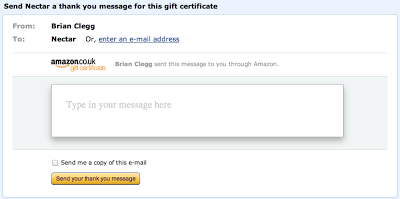 Everyone knows that if you say something with your arm twisted up your back it doesn't really count. Parents are normally as aware of this as everyone else. But there is one case when parents, particularly middle class parents, have a blind spot. And that is the 'Thank-you' note. (How do you spell that? Should it be 'Thank You' note? Who cares?)
Everyone knows that if you say something with your arm twisted up your back it doesn't really count. Parents are normally as aware of this as everyone else. But there is one case when parents, particularly middle class parents, have a blind spot. And that is the 'Thank-you' note. (How do you spell that? Should it be 'Thank You' note? Who cares?)I have broached this subject because Amazon, perhaps feeling guilty about avoiding paying tax, has turned into a nagging parent. I had turned some Nectar points into an Amazon gift certificate, applied it to my account and Amazon gave me a quick nudge in the ribs and said 'Oi! Where do you think you are going? Before you play with your new certificate, send Nectar a thank-you message like a good boy.' Leaving aside the amusement value of being asked to thank the piece of plastic that is my Nectar card, it made me think about thank-you notes and how much I hate them.
I can remember all too horribly that long drawn out process over several days attempting to get small children to write thank you notes, contemplating writing them with the left hand myself, and finally pinning them down long enough to scribble some platitudes. And to be honest they aren't always nice to receive either. When you receive that 3 page essay from little Marmaduke, complete with a few pencil sketches and an impromptu sonnet of praise for your gift of a handkerchief, the feeling is not one of pleasure but rather of guilt at never achieving this level of response.
Don't get me wrong. Thank-you's of the right kind are wonderful. When they aren't automatic responses, but someone takes the time to say 'Thanks for that book, it was absolutely brilliant,' who most of the time doesn't bother to thank you for gifts then you know it has really meant something. You get a little warm glow of self-congratulation. But the knee-jerk thank-you note (something I never experienced as a child because we weren't really middle class, and anyway I saw everyone who gave me presents most weeks) is not something I can warm to.
As to Amazon giving me a nanny nudge towards issuing a thank-you:
For those of you who were fans of Searle & Willans' How to Be Topp , (and if you aren't a fan you should rush out and buy a copy now), I leave you with the Molesworth Self-Adjusting Thank-You Letter:
Dear Amazon,
Thank you so much for your unexpected reminder to issue a thank-you. It was a lovely surprise, just what I've always wanted. I will print it off and put it on the mantlepiece, alongside the invitation to the Lord Lieutenant's Ball. Super.
With much love,
Brian
As an after xmas wheeze n. molesworth presents his self-adjusting thank-you letter. Cut out hours of toil pen biting wear on elbows blotches and staring out of windows.
Strike Out words with do not apply.
Dear (Aunt) (Uncle) (Stinker) (Gran) (Clot) (Pen-Pal)
Thank you very much for the (train) (tractor) (germ gun) (kite) (delicious present*) (sweets) (space pistol) (toy socks)
It was (lovely) (useful) (just as good as the other three) (not bad) (super)
And I hav (played with it constantly) (busted it already) (no patience with it) (given it to the poor boys) (dismantled it)
I am feeling (very well) (very poorly) (lousy) (in tip-top form) (sick) I hope you are too.
My birthday when next present is due is on . . . . . .
From . . . . . .
(Postage must be prepaid.)
* When you can’t remember what it was.
Published on January 11, 2013 00:36
January 10, 2013
The interweb at its finest
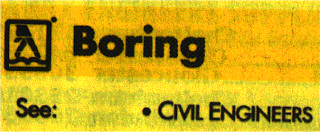 My favourite entry in Yellow Pages
My favourite entry in Yellow Pages (sadly long since removed)I think we sometimes forget how much the internet/world wide web has changed the way we do things for the better. Here's a little story to illustrate this - and also I think to show that the power of something like the web is the ability to use it in unexpected ways.
I needed to replace a couple of tyres on a car. I was quite happy with the outfit I'd used for new tyres before, but because I don't buy tyres very often, I couldn't remember the company's name. This has happened before, rather a lot.
Of course, if I was all organized and such I would have carefully noted down the details of the tyre place in Evernote and I could just search that and pull them up in seconds. But I wasn't and I didn't. What can I say? I'm lazy.
In the old days I would have hunted for that tree graveyard the Yellow Pages ('I'm sure I left it there...') looked up tyre services, and then would have spent 15 minutes looking through the adverts, trying to decide which of the silly names was the business I used before. 'That seems vaguely familiar... but then so does this...'
Now, though, with the interweb at hand, the way I came to it was more a parallel of the way the brain deals with information. Though I couldn't remember the name of the tyre shop, I could remember where it was. But only in the sense of 'It's on that roundabout, you know, the one near Go Outdoors' - I didn't know a street name. No problem. Pull up Google maps, follow the route from home to 'that roundabout' and I have the location pinned down. Zip into Streetview - and I can see the building and read the name of the company.
At this point, quite recently I would have then turned to the electronic version of the phone book to get the number. But why bother? Type the company name in Google and up pops the phone number. I'm there in under a minute after employing the vaguest of search algorithms.
And that's why the internet/web is so good.
Published on January 10, 2013 00:16



